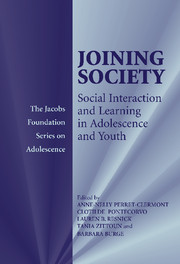Book contents
- Frontmatter
- Contents
- List of Contributors
- Foreword
- Preface
- I Introduction
- II Youth-Constructed Socialization
- III Personal Agency Through Collective Activity
- IV Learning in Practice and Discourse
- V Intergenerational Sites for Thinking
- 15 Thinking with Others: The Social Dimension of Learning in Families and Schools
- 16 The Role of Discourse in the Transformation of Parent–Adolescent Relationships
- 17 Interactive Minds: A Paradigm from Life Span Psychology
- 18 Thinking “Youth,” Thinking “School”: Social Representations and Fieldwork in Educational Research
- VI Pathways to Adulthood in National Context
- Index
- References
17 - Interactive Minds: A Paradigm from Life Span Psychology
Published online by Cambridge University Press: 08 January 2010
- Frontmatter
- Contents
- List of Contributors
- Foreword
- Preface
- I Introduction
- II Youth-Constructed Socialization
- III Personal Agency Through Collective Activity
- IV Learning in Practice and Discourse
- V Intergenerational Sites for Thinking
- 15 Thinking with Others: The Social Dimension of Learning in Families and Schools
- 16 The Role of Discourse in the Transformation of Parent–Adolescent Relationships
- 17 Interactive Minds: A Paradigm from Life Span Psychology
- 18 Thinking “Youth,” Thinking “School”: Social Representations and Fieldwork in Educational Research
- VI Pathways to Adulthood in National Context
- Index
- References
Summary
Supporting youth in their joining of society is a lofty goal that seems more than worthy and timely to pursue. Support for that pursuit can be found in a number of different research areas of developmental and life span psychology. For instance, Erikson's notion of generativity, an aspect of personality functioning that may develop at around midlife, highlights the importance of the transmission of knowledge and insight between generations for the young and the old, as well as for society (e.g., Erikson, Erikson, & Kivnick, 1986). Roger Säljö's chapter refers to another strong tradition in developmental research that has focused on the critical role of social interaction in learning. This research is building on a long tradition that includes the seminal works of scholars such as Baldwin, Piaget, Vygotsky, and Luria. However, although it is one of the fundamental tenets of the social and behavioral sciences that human behavior and development are at least partly a creation of social forces, social interaction, and social transmission, it is also true that theory and method do not always coincide in developmental work. Thus, there is a continuing search for the role of the social-interactive in developmental theory and research.
One persuasive example is the enrichment and transformation of social-learning theory by cognitive dimensions to better understand the social and collective foundation of action and thought (e.g., Bandura, 1998).
- Type
- Chapter
- Information
- Joining SocietySocial Interaction and Learning in Adolescence and Youth, pp. 252 - 258Publisher: Cambridge University PressPrint publication year: 2003



